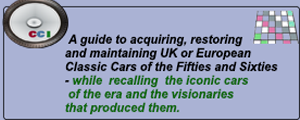 Internal combustion engines produce power through burning fuel to create heat and pressure, which is converted to mechanical energy to power the vehicle.
Internal combustion engines produce power through burning fuel to create heat and pressure, which is converted to mechanical energy to power the vehicle.
 Early engines tended to generate more heat than could be converted into power, creating a need for a cooling system to control operating temperatures and prevent overheating.
Early engines tended to generate more heat than could be converted into power, creating a need for a cooling system to control operating temperatures and prevent overheating.
Restorers should not think twice when assessing the state of health of a car's powertrain to take a very close look at its cooling system and, if it does not appear to be up to the job, have it overhauled at the same time as the engine.
Two types of cooling systems have been utilised over the decades: air and water.
While the vast majority of motor vehicles produced in Europe and the UK during the Fifties and Sixties featured closed liquid cooling systems, engines in specific models were air-cooled, with the best known being the flat four-cylinder powerplant in the iconic Volkswagen Beetle, that sold more than twenty million models.
With the cool air flowing airflow over the cylinder heads and block, there was no separate cooling system to service, no coolant to drain and flush, no thermostat to change, and no water pump to leak and fail, just a belt-driven fan to blow air over the engine.
 In closed liquid-cooled systems, the water pump circulates the coolant through the cylinder block and cylinder heads to absorb and carry away the excess combustion heat and to the radiator, expelling heat into the atmosphere moving past its cooling fins and cores.
In closed liquid-cooled systems, the water pump circulates the coolant through the cylinder block and cylinder heads to absorb and carry away the excess combustion heat and to the radiator, expelling heat into the atmosphere moving past its cooling fins and cores.
In a liquid cooling system, the system has to be both pressurised and thermostatically controlled to improve efficiency.
By operating the system at higher pressures, typically running between 7-16 psi, the boiling point of the water-based coolant rises. By raising the boiling point to 250 degrees Fahrenheit (121 degrees Celsius) or even higher, the coolant will not reach boiling point, although losing efficiency at standard engine operating temperatures of 180-230 degrees Fahrenheit.
The pressure is controlled by the pressure cap on the radiator or recovery tank.
![]()
The first stage in assessing the condition of a cooling system is to remove the radiator cap and look for rust.
Ideally, the water should be clear or the colour of coolant.
Older cars that run with only water in the cooling system may show a little rusty discolouration, but the rust should not be thick.
After the vehicle has been left running to warm the car up for around twenty minutes, it is recommended to check the radiator by carefully opening the radiator cap to observe if the coolant is flowing freely in the upper reservoir of the radiator.
The freeze plugs should also be closely examined for leaks, as well as the coolant for traces of oil.
If the engine has suffered a cracked block or blown head gasket, engine oil will sometimes get into the cooling system.
 When assessing the cooling system in a vehicle, special attention needs to be paid for corrosion, which will invariably occur over the years that the car has been in operation. Even more so if it has been in storage in a damp bar or storerom.
When assessing the cooling system in a vehicle, special attention needs to be paid for corrosion, which will invariably occur over the years that the car has been in operation. Even more so if it has been in storage in a damp bar or storerom.
The first sign that the system is corroded is either white or green powder around the radiator.
A cooling system can fail for several reasons.
The usual reason for a significant failure is coolant leaks, a sure sign of system wear and tear. On occasion, the system may fail because of physical damage to the radiator through accident damage.
![]()
 If the engine runs and the vehicle's gauges are in order, the best way to find if the cooling system is in working order is to test the water temperature.
If the engine runs and the vehicle's gauges are in order, the best way to find if the cooling system is in working order is to test the water temperature.
 If this simple test does not provide the answer, the most accurate assessment will be reached by finding a specialist who has the equipment to conduct a pressure level test on the system, designed to simulate the high levels of pressure that the system will be under when the engine is running at maximum revs.
If this simple test does not provide the answer, the most accurate assessment will be reached by finding a specialist who has the equipment to conduct a pressure level test on the system, designed to simulate the high levels of pressure that the system will be under when the engine is running at maximum revs.
 At the same opportunity, the cooling system specialist should also test the state of the rubber hoses.
At the same opportunity, the cooling system specialist should also test the state of the rubber hoses.
If it turns out that they are in any less than perfect condition, they should be immediately replaced.
Take me back to the home page.
me5


